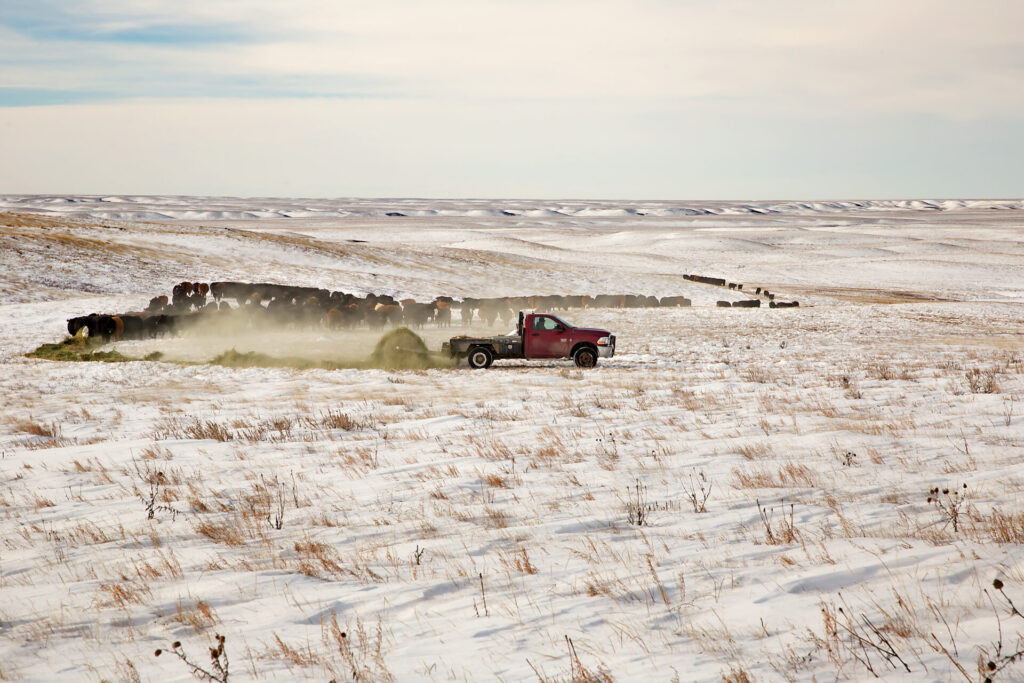Tuning In To Beef Industry Podcasts 🎙️

Podcast listening is on the rise, with a third of Canadians consuming an average of four hours of podcasts per week, according to a Media Technology Monitor survey. This includes a growing number of Canadian farmers who are tuning in to a new crop of beef audio podcasts for industry insights.
Looking for something new to listen to while feeding cattle this winter? Beef up your podcast lineup with these three podcasts brought to you by the Canadian cattle industry.
THE BEEF CATTLE HEALTH AND NUTRITION PODCAST
New on the scene as of October 31, 2022, The Beef Cattle Animal Health and Nutrition Podcast is the first podcast to focus exclusively on beef cattle management topics from a Canadian perspective. Hosted by Dr. John Campbell, a veterinarian and professor at the Western College of Veterinary Medicine at the University of Saskatchewan, The Beef Cattle Animal Health and Nutrition Podcast features weekly interviews with veterinarians, nutritionists, leading-edge producers and researchers from across Canada. Topics focus on animal health, nutrition and management.
Recent episodes address the basics of feed testing, intranasal vaccines and extended grazing systems. This podcast is funded by the Beef Cattle Research Council, Alberta Beef Producers and the Canadian Beef Cattle Check-Off.
New to podcasts? A podcast is a collection of audio episodes that focus on a common theme—think of it as on-demand talk radio.
Click “play” to listen to a podcast episode through your smartphone, tablet or computer via headphones, speakers or other Bluetooth devices.
“Follow” or “subscribe” to a podcast with an app such as Spotify on your smartphone to have all future episodes delivered to you automatically.
COWS ON THE PLANET
The Cows on the Planet podcast provides a different focus for the industry, targeting Canadian consumers with science-based information about the true environmental impact of beef production. Cows on the Planet is the first podcast to solely address consumer confidence in the production and consumption of Canadian beef through the lens of science and history.
Co-hosts (Dr. Kim Stanford, a beef researcher with the University of Lethbridge, and Dr. Tim McAllister, principal scientist with Agriculture and Agri-Food Canada’s Lethbridge Research and Development Centre) interview industry experts to answer timely questions such as: Can we eat our way out of climate change? How much water does it take to make a burger? Are cows wasting human food or eating food waste? Cows on the Planet launched in August 2021 with funding from the Beef Cattle Research Council, Canada Beef and the Canadian Beef Cattle Check-Off.
SIMPLY VERIFIED BEEF PODCAST
The Simply Verified Beef Podcast discusses various parts of the Canadian beef supply chain from producers to consumers. Tune in to hear interviews with guests from coast to coast on a wide range of beef industry topics.
Verified Beef Production Plus (VBP+), a voluntary on-farm certification program that the BCRC oversees, launched this podcast in July 2021 to explore topics that fall under its four pillars: on-farm food safety, biosecurity, animal care and environmental stewardship. Get started with episodes on genetic improvement, water and riparian area management and remote drug delivery devices.
Each of these beef-related podcasts are available through multiple platforms including Apple Podcasts, Spotify, Google Podcasts and Amazon Music. “Follow” or “subscribe” to be notified when a new episode is added. Links to each also are available through the BCRC’s new Podcasts webpage, found under the Posts & Multimedia navigation tab at BeefResearch.ca.
Le partage ou la réimpression des articles du blog du BCRC est bienvenu et et encouragé. Veuillez mentionner le Conseil de recherche sur les bovins de boucherie, indiquer l’adresse du site web, www.BeefResearch.ca/fr, et nous faire savoir que vous avez choisi de partager l’article en nous envoyant un courriel à l’adresse info@beefresearch.ca.
Vos questions, commentaires et suggestions sont les bienvenus. Contactez-nous directement ou suscitez une discussion publique en publiant vos réflexions ci-dessous.